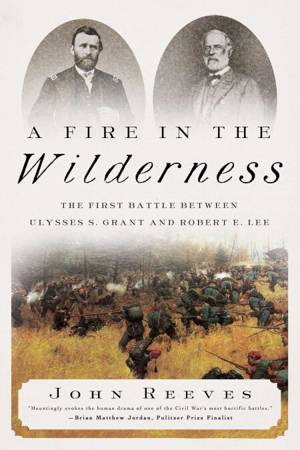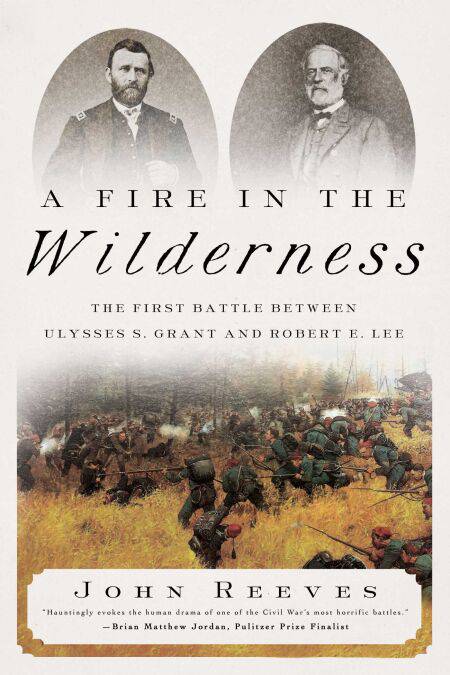
- Retrait gratuit dans votre magasin Club
- 7.000.000 titres dans notre catalogue
- Payer en toute sécurité
- Toujours un magasin près de chez vous
- Retrait gratuit dans votre magasin Club
- 7.000.0000 titres dans notre catalogue
- Payer en toute sécurité
- Toujours un magasin près de chez vous
A Fire in the Wilderness EBOOK
The First Battle Between Ulysses S. Grant and Robert E. Lee
John Reeves
Ebook | Anglais
21,24 €
+ 21 points
Format
Description
The riveting account of the first bloody showdown between Ulysses S. Grant and Robert E. Lee—a battle that sealed the fate of the Confederacy and changed the course of American history.
In the spring of 1864, President Lincoln feared that he might not be able to save the Union. The Army of the Potomac had performed poorly over the previous two years, and many Northerners were understandably critical of the war effort. Lincoln assumed he’d lose the November election, and he firmly believed a Democratic successor would seek peace immediately, spelling an end to the Union. A Fire in the Wilderness tells the story of that perilous time when the future of the United States depended on the Union Army’s success in a desolate forest roughly sixty-five miles from the nation’s capital.
At the outset of the Battle of the Wilderness, General Lee’s Army of Northern Virginia remained capable of defeating the Army of the Potomac. But two days of relentless fighting in dense Virginia woods, Robert E. Lee was never again able to launch offensive operations against Grant’s army. Lee, who faced tremendous difficulties replacing fallen soldiers, lost 11,125 men—or 17% of his entire force. On the opposing side, the Union suffered 17,666 casualties.
The alarming casualties do not begin to convey the horror of this battle, one of the most gruesome in American history. The impenetrable forest and gunfire smoke made it impossible to view the enemy. Officers couldn’t even see their own men during the fighting. The incessant gunfire caused the woods to catch fire, resulting in hundreds of men burning to death. “It was as though Christian men had turned to fiends, and hell itself had usurped the place of the earth,” wrote one officer. When the fighting finally subsided during the late evening of the second day, the usually stoical Grant threw himself down on his cot and cried.
In the spring of 1864, President Lincoln feared that he might not be able to save the Union. The Army of the Potomac had performed poorly over the previous two years, and many Northerners were understandably critical of the war effort. Lincoln assumed he’d lose the November election, and he firmly believed a Democratic successor would seek peace immediately, spelling an end to the Union. A Fire in the Wilderness tells the story of that perilous time when the future of the United States depended on the Union Army’s success in a desolate forest roughly sixty-five miles from the nation’s capital.
At the outset of the Battle of the Wilderness, General Lee’s Army of Northern Virginia remained capable of defeating the Army of the Potomac. But two days of relentless fighting in dense Virginia woods, Robert E. Lee was never again able to launch offensive operations against Grant’s army. Lee, who faced tremendous difficulties replacing fallen soldiers, lost 11,125 men—or 17% of his entire force. On the opposing side, the Union suffered 17,666 casualties.
The alarming casualties do not begin to convey the horror of this battle, one of the most gruesome in American history. The impenetrable forest and gunfire smoke made it impossible to view the enemy. Officers couldn’t even see their own men during the fighting. The incessant gunfire caused the woods to catch fire, resulting in hundreds of men burning to death. “It was as though Christian men had turned to fiends, and hell itself had usurped the place of the earth,” wrote one officer. When the fighting finally subsided during the late evening of the second day, the usually stoical Grant threw himself down on his cot and cried.
Spécifications
Parties prenantes
- Auteur(s) :
- Editeur:
Contenu
- Nombre de pages :
- 352
- Langue:
- Anglais
Caractéristiques
- EAN:
- 9781643137018
- Date de parution :
- 03-05-21
- Format:
- Ebook
- Protection digitale:
- Adobe DRM
- Format numérique:
- ePub

Les avis
Nous publions uniquement les avis qui respectent les conditions requises. Consultez nos conditions pour les avis.






